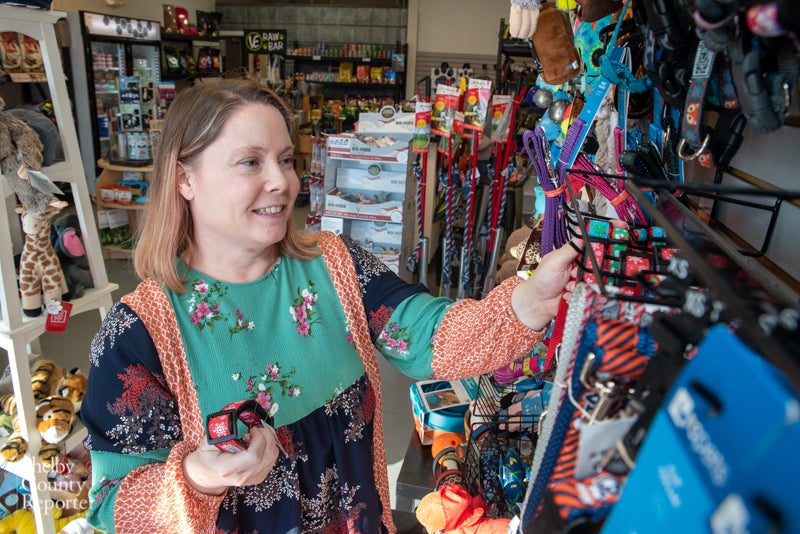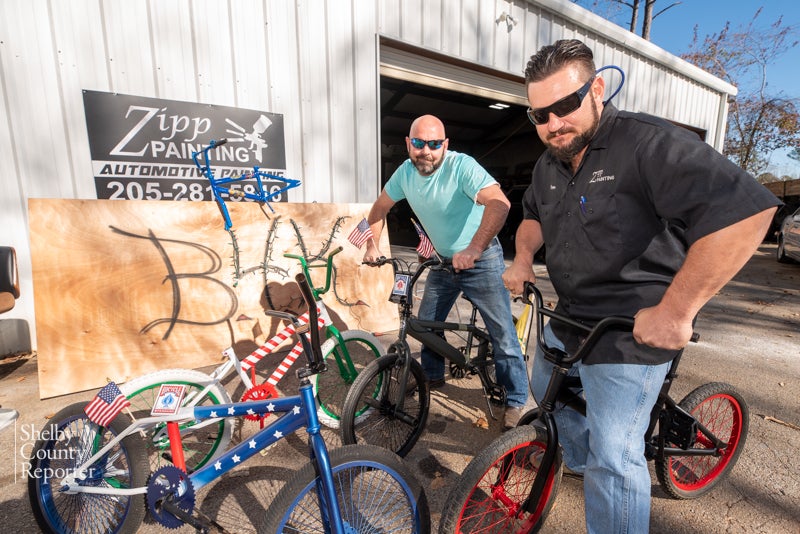Local businesses weather supply chain woes
Published 11:17 am Tuesday, December 21, 2021

- Kim McCulla arranges inventory at her Chelsea store, Whiskers & Wags Pet Boutique. McCulla said she started ordering fall and Christmas items two months sooner than usual when she heard about the supply chain issues from other small business owners she knows. (Reporter Photo/Keith McCoy)
|
Getting your Trinity Audio player ready...
|
By EMILY SPARACINO | Staff Writer
The supply chain issues we read and hear about almost daily have affected businesses of every size, from large corporations to small businesses.
In Shelby County, like other areas across the state and country, the effects of supply chain disruptions amid the COVID-19 pandemic have reached businesses and even nonprofit organizations, causing added stress during the holidays.
Chelsea resident Charlie Bradford, founder of a nonprofit called Bikes 4 Kids that gives restored and custom bicycles to children for free, said finding parts such as chains, tires, tubes, grips and seats for bike restorations and customizations has been extremely challenging lately.
“We have some custom bikes coming up that are going to be a close call getting everything we need at the last minute,” Bradford said. “Paint has been horrible. Someone helps us supply paint, but they’re having trouble, too.”
Bradford said certain items he ordered in early November still have not arrived.
Bradford can utilize some of the organization’s used bikes in inventory for parts if he needs to, but he tries not to take anything off new bikes that can be given to children as they are.
Bradford said people who have donated old bikes and parts have helped fill the gaps created by the supply shortages.
“We’ll be doing Christmas bikes all the way up through Dec. 23 because of last-minute stuff coming in,” Bradford said. “We’re doing almost 70 custom bikes this year, almost twice what we did last year. It’s a lot to do, but we’re getting it done.”

Bikes 4 Kids founder Charlie Bradford and his friend, Zac Ingram, have faced challenges with finding and ordering chains, tires and other parts they need to restore and customize the bikes they will give to children this Christmas. (File)
Kim McCulla, owner of Whiskers & Wags Pet Boutique in Chelsea, said she started ordering items for fall and Christmas in August, about two months sooner than she normally does, when she began hearing from other small business owners about the supply chain issues.
“The biggest problem was storage here,” McCulla said. “We have had issues with getting some of our shipments lately. Thankfully, most of our holiday gift items came in early, so we are well stocked for the holidays.”
McCulla said most of the items she orders for her store are made in the United States or Canada, meaning she has largely avoided the challenges of goods being stuck on container ships at ports.
McCulla also started taking a proactive approach when placing her weekly orders of pet food, a staple product for many of her customers.
“We overstock slightly,” she said. “I’ll look at inventory levels of our suppliers, and if they look like they’re starting to get a little low, I’ll order an extra bag or two. For us, it’s more planning and patience on the few things we have ordered in the last few weeks.”
Paige Burnett, owner of Gifted – Handmade Gifts & More in Pelham, said she also tries to order items, especially Christmas items, early in order for them to be delivered in time.
Even so, Burnett said the supply chain issues have affected her shop, too.
“Candles have been one thing that has been hard to get,” she said. “Swan Creek brand was not able to get the pottery that they use; therefore, they had to switch to glass. They are known for their pottery, so this made for a hard sale.”
Burnett has also grappled with shipping delays. Certain items that normally would have arrived in two days took more than two weeks.
“I do think we have had more (people) shop locally, but I honestly believe that this is due to them being in a panic about not receiving the items they have ordered,” Burnett said. “I would love for this to be something that they remember in the future. There are lots of things that can be bought right here in our city, and with that comes personal service, custom wrap, a friendly face and smile. Plus, I don’t think many people realize that shopping locally helps with our schools, roads and the local families that live in our community.”
In a recent supply chain panel discussion, Jeffrey Purvis, vice president of operations at A.C. Legg in Calera, said his company has also tried to stay ahead in terms of ordering and stocking ingredients.
“We do business making spices and seasonings, and those spices that we currently get come from all over the world, so this has definitely had an impact on us the last 20 months,” Purvis said, and added the company gets nearly 250 raw materials from five continents. “By the nature of what we do here and how quick we turn it around, we have to keep a couple months of supply, so we don’t rely on just-in-time inventory except for a handful of domestic items.”
McCulla said she has had to order a different size or variation of an item at times, but she has always found something comparable to the original item.
“We haven’t had any major gaps that we weren’t able to fill with something just slightly different,” she said. “It takes some creativity to find that alternative. I think our customers understand that we stock for a lot of different types of dogs and cats and special needs.”
For McCulla, shipping times have been less of an issue than delivery times.
“What we consistently see is a shipment will be on time and it will have an estimated delivery date, then it will go to pending,” she said. “It will spend about a week in pending, then it will be delivered the next day. We’ve gotten used to that pattern. Hopefully, that trend doesn’t get worse.”
A global impact
Dr. Alex Mechitov, a professor in the University of Montevallo’s Stephens College of Business, said the pandemic has led to one of the deepest recessions since World War II.
“According to current estimates, it costs the world global economy about $20 to $30 trillion, and likely this estimate will only continue to grow,” Mechitov said during the panel discussion. “At some point, almost 40 percent of small businesses were temporarily closed in this country.”
According to Mechitov, lockdowns were among the main factors in COVID-19 affecting the supply chain.
“We also know that COVID somehow affected the size of the labor force,” he said, and added other factors in the supply chain issues include climate change, political uncertainty and changes in economic policies. “When COVID started, we had a big drop in demand for services, and that led to substantially increased demand for products. We know from supply chain theory that when we have big changes in consumer demand, it leads to even larger fluctuations along the supply chain because all agents of the supply chain react to this change in consumer demand.”
Signature Homes CEO Dwight Sandlin, another panel discussion participant, said he has never seen disruptions of this magnitude in his 40 years in the home-building business.
When the first surge of the pandemic hit, Sandlin said many in the home-building business laid off employees, reduced manufacturing and reduced productivity in supply.
“No one had any concept that it was going to rebound so quickly,” Sandlin said. “The impact is tremendous.”
According to Sandlin, housing starts dropped from 1.725 million homes in March 2021 to 1.55 million homes in August, meaning housing starts decreased by 10 percent in just five months.
“Most every company that I’m aware of has lost about 10 percent of the closings this year,” he said. “With an average sales price of $408,000 nationally for new homes, the impact that’s occurred is at $43 billion of deferred income this year. In our company, we do about $300 million of revenue a year, and we will have deferred revenue of $28 million this year. If supply chain issues had not been in play, we would be up some $30 million this year.”
In addition, Sandlin said the demand for apartments has far outstripped the supply. According to CNBC, from January to June, an 11.4-percent increase in apartment rents occurred, almost 300 percent higher in a six-month period than 2017 to 2019.
Sandlin said a frustrating reality is that his company could have two houses under construction in the same neighborhood at the same time, and they could differ in their completion schedules by as many as eight weeks simply because of materials – windows, garage doors, appliances and other items – being delayed.
“We have new issues come to us each day,” he said. “The problem is it’s completely illogical. That’s very frustrating to our customers.”
Caleb Kennedy, general manager of the Birmingham location of Cintas, a uniform rental company, said Cintas had to re-evaluate its services at the beginning of the pandemic.
“When COVID hit literally overnight, probably 20 percent of our business was down in restaurants,” Kennedy said. “We started to go into pivot mode as far as what’s going to be our response.”
The company started to use backpack sprayers for dispensing cleaning solutions in local facilities and already had a large supply of items, such as gloves, sanitizer and cleaning chemicals, that were crucial in mitigating the virus.
“I think companies have to be willing to be nimble and flexible to change maybe their old norms back to new things,” he said. “While we took a 20 percent decrease overnight, we were able to bounce back and respond and really come out of that. We literally can see trends coming before most people because we touch just about every industry.”
Finding solutions
Mechitov said the current problems businesses are facing likely are not short-term, and developing a more resilient supply chain model by using more standardized parts and multi-sourcing production, among other things, could be key in resolving the issues.
“The effects of this will be remembered for many years to come, and it’s going to shape the strategy for all companies moving forward,” Kennedy said. “I think the solution is complex and multi-layered. We are an innovative country by nature. We will continue to think our way out of this, and we will continue to adjust our strategies until we are on the backside of this.”
Purvis and McCulla said having patience with people working through the supply chain issues is important.
“Those who are working retail right now are the ones that showed up,” McCulla said. “The supply chain issues and shipping issues are not the retail clerk’s fault.”
Sandlin echoed Kennedy’s sentiments about businesses, both big and small, learning how to pivot when it comes to surviving a crisis like the pandemic.
“We will continue to adjust, as every other business on this panel will do,” Sandlin said. “We will adjust to what the market gives us. I’ve got faith in entrepreneurs, I’ve got faith in big companies. As for the global supply chain right now, I think it’s going to make people step back and reassess some things.”









